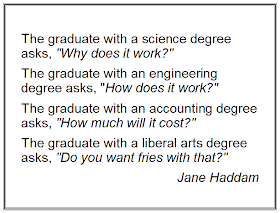Monster blog has this
article about Gen Y Talent Myths. I am amazed at the nearsightedness in evidence here. Not to knock the guy -- he has spent over six years as a career counselor at a top-flight research university so he must know the habits and talents of the entire Gen Y demographic, right? Anyway. I was amused.
First, he feels that Gen Y is CONFUSED rather than LAZY. Okay, not all of them are lazy but the truth is that they would rather be playing video games and chatting and Facebooking than working. This is not a particular surprise since every generation back to prehistoric times has said that about it's teenagers.
That being too complicated a thought, he felt it was due to "the world and technology constantly changing and becoming more complex, members of Gen Y are just trying to decipher how to navigate their way around" and "Generation Y lacks the experience and foundation to best utilize these various technological resources." On the other hand, "Generation Y is the most experienced and qualified to understand and decipher the social media landscape".
Proof by confusing contradiction?
He then feels that if we aren't "moving at the speed of these technologies, we are already behind before we’ve even started." You say, "Touche", I say "Cliche." Come on, dredge up a better one than that.
"Moving at the speed of these technologies" doesn't even mean anything.
Generation Y seems to "Lack Morals". According to David, they merely have "Different Values" because they were the product of the ‘Me Generation.’ I guess that excuses them from sharing the values of the society at large or something.
 |
| Conservative AND socially conscious. |
Now we get weird. Correlation, causation and all that. He claims that Gen Y got Obama elected (really!) and so we think they must be more liberal. They're not, though, because they "prefer to seek opportunities to make a difference in their communities". Wow. They're not liberal because they like to make a difference? That's just funny.
"How else do you explain the rise of social entrepreneurs (Tom’s Shoes?), the growth of core value-laden companies such as Zappos and Google (witnessed by Google’s core principle 'you can make money without doing evil?'), and the new found commitment/interest in non-profit organizations?" Actually, dude, those companies weren't founded by, and aren't run by, GenY.
The last bit of fun comes when this guy claims that GenY thinks it's smarter than the older folk, and therefore
is smarter. How dumb can you be?
Every generation thinks it's smarter than the previous one. This one isn't smarter, but they think they are. David feels they are smarter "as long as they utilize reputable sources" and points out that "Five-year-old children are able to find more information on a smartphone or tablet than their parents."
Holy crap, what kind of evidence is that? Are you sure you're at a university? A five year-old on an iPad makes for a cute picture but it’s less of an indication of brilliance than a 1990 kid on a Commodore 64 with an encyclopedia nearby.
The next line is the funniest. In his day, "one could get a quality college education with an SAT score of 1100 … care to guess the average now?" Uh, 1538.
Does genius boy know why the average has risen ... all the teachers reading this do. Ding-ding-ding!
Three sections! 1538/3 is 513 or so per section. Back in his day, the per-section score was 550. OOPS, not so good on the math, either. Must be more of that top-flight research university training, huh?.
I guess I know why so many kids come out of college they way they do.
Obligatory Nov 5 reference:
The article below the fold:













































